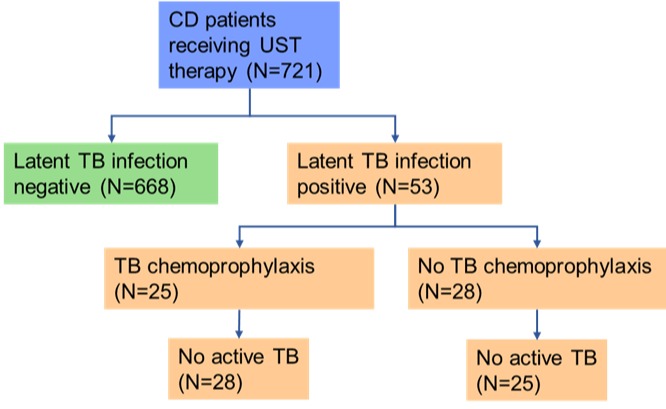Back
Poster Session E - Tuesday Afternoon
Category: IBD
E0364 - The Safety of Ustekinumab Treatment in Patients With Moderate-to-Severe Crohn’s Disease and Latent Tuberculosis/HBV Infection: A Nationwide Retrospective Study
Tuesday, October 25, 2022
3:00 PM – 5:00 PM ET
Location: Crown Ballroom
- RL
Rongbei Liu, MD
Sir Run Run Shaw Hospital affiliated to Zhejiang University, School of Medicine
Hangzhou, Zhejiang, China
Presenting Author(s)
Rongbei Liu, MD1, Qian Cao, MD, PhD1, Zhilun Li, 2
1Sir Run Run Shaw Hospital affiliated to Zhejiang University, School of Medicine, Hangzhou, Zhejiang, China; 2School of Basic Medicine and Clinical Pharmacy, China Pharmaceutical University, Nanjing, Jiangsu, China
Introduction: Ustekinumab is a human monoclonal antibody specially blocking interleukin-12/23 has been approved in China for moderate-to-severe Crohn's disease in 2020. There is concern about the risk of infectious among biological agents treated patients, because of the high prevalence of tuberculosis and hepatitis B viral (HBV) infection in China and the expected risk of reactivation is higher in these patients. We aimed to assess the risk of tuberculosis and hepatitis B virus reactivation in Crohn’s disease patients with latent tuberculosis infection (LTBI) and previous HBV infection who are receiving Ustekinumab.
Methods: A multi-center retrospective cohort study was performed at 68 hospitals in China of 721 adult patients with CD receiving ustekinumab from May 1, 2020 to October 31, 2021, Crohn's disease with concomitant LTBI or HBV carrier were included. All patients were tested for hepatitis B serology, T-SPOT TB and tuberculin skin tests at baseline. LTBI was defined as positive of T-SPOT TB or tuberculin skin tests, HBV carrier was defined as hepatitis B surface antigen and isolated anti-HBc positivity. The primary outcome of this study was tuberculosis or hepatitis B reactivation.
Results: Patients with Crohn's disease concomitant LTBI or HBV carrier receiving ustekinumab therapy were retrospectively enrolled from 17 hospitals in China. Fifty-three Crohn’s disease with LTBI patients and seventeen Crohn’s disease patients with HBV carrier patients receiving ustekinumab were included. FIGURE1 summarized the inclusion of the latent TB patients treated with ustekinumab. The average follow-up was 32 ± 20 weeks and 28 ± 16 weeks, respectively. Twenty-five Crohn’s disease patients with LTBI received chemoprophylaxis regimen and eleven HBV carrier patients received antiviral prophylaxis. No cases of LTBI reactivation, virologic reactivation, and liver dysfunction were observed during the follow-up period.
Discussion: The risk of reactivation of HBV/TB infection during immunosuppressant treatment is dependent on many factors and it influences the choice of practice significantly. This study has a medium time follow-up period and it is the largest studies involving patients with CD coexistent with TB or HBV receiving ustekinumab therapy in a high TB/HBV burden region. The outcomes indicate that ustekinumab could be safe for Crohn’s disease since whether received prophylaxis regimen or not, none developed tuberculosis, liver enzymes increasing, persistent hepatitis or acute liver failure during therapy.

Disclosures:
Rongbei Liu, MD1, Qian Cao, MD, PhD1, Zhilun Li, 2. E0364 - The Safety of Ustekinumab Treatment in Patients With Moderate-to-Severe Crohn’s Disease and Latent Tuberculosis/HBV Infection: A Nationwide Retrospective Study, ACG 2022 Annual Scientific Meeting Abstracts. Charlotte, NC: American College of Gastroenterology.
1Sir Run Run Shaw Hospital affiliated to Zhejiang University, School of Medicine, Hangzhou, Zhejiang, China; 2School of Basic Medicine and Clinical Pharmacy, China Pharmaceutical University, Nanjing, Jiangsu, China
Introduction: Ustekinumab is a human monoclonal antibody specially blocking interleukin-12/23 has been approved in China for moderate-to-severe Crohn's disease in 2020. There is concern about the risk of infectious among biological agents treated patients, because of the high prevalence of tuberculosis and hepatitis B viral (HBV) infection in China and the expected risk of reactivation is higher in these patients. We aimed to assess the risk of tuberculosis and hepatitis B virus reactivation in Crohn’s disease patients with latent tuberculosis infection (LTBI) and previous HBV infection who are receiving Ustekinumab.
Methods: A multi-center retrospective cohort study was performed at 68 hospitals in China of 721 adult patients with CD receiving ustekinumab from May 1, 2020 to October 31, 2021, Crohn's disease with concomitant LTBI or HBV carrier were included. All patients were tested for hepatitis B serology, T-SPOT TB and tuberculin skin tests at baseline. LTBI was defined as positive of T-SPOT TB or tuberculin skin tests, HBV carrier was defined as hepatitis B surface antigen and isolated anti-HBc positivity. The primary outcome of this study was tuberculosis or hepatitis B reactivation.
Results: Patients with Crohn's disease concomitant LTBI or HBV carrier receiving ustekinumab therapy were retrospectively enrolled from 17 hospitals in China. Fifty-three Crohn’s disease with LTBI patients and seventeen Crohn’s disease patients with HBV carrier patients receiving ustekinumab were included. FIGURE1 summarized the inclusion of the latent TB patients treated with ustekinumab. The average follow-up was 32 ± 20 weeks and 28 ± 16 weeks, respectively. Twenty-five Crohn’s disease patients with LTBI received chemoprophylaxis regimen and eleven HBV carrier patients received antiviral prophylaxis. No cases of LTBI reactivation, virologic reactivation, and liver dysfunction were observed during the follow-up period.
Discussion: The risk of reactivation of HBV/TB infection during immunosuppressant treatment is dependent on many factors and it influences the choice of practice significantly. This study has a medium time follow-up period and it is the largest studies involving patients with CD coexistent with TB or HBV receiving ustekinumab therapy in a high TB/HBV burden region. The outcomes indicate that ustekinumab could be safe for Crohn’s disease since whether received prophylaxis regimen or not, none developed tuberculosis, liver enzymes increasing, persistent hepatitis or acute liver failure during therapy.

Figure: Analysis of the incidence of active TB in the latent TB infection with UST therapy
Disclosures:
Rongbei Liu indicated no relevant financial relationships.
Qian Cao indicated no relevant financial relationships.
Zhilun Li indicated no relevant financial relationships.
Rongbei Liu, MD1, Qian Cao, MD, PhD1, Zhilun Li, 2. E0364 - The Safety of Ustekinumab Treatment in Patients With Moderate-to-Severe Crohn’s Disease and Latent Tuberculosis/HBV Infection: A Nationwide Retrospective Study, ACG 2022 Annual Scientific Meeting Abstracts. Charlotte, NC: American College of Gastroenterology.
